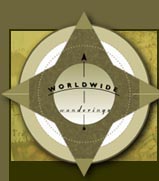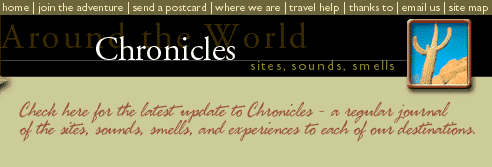|
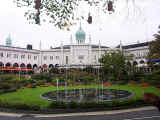 Sept.
12-16, 1998 Copenhagen, Denmark Sept.
12-16, 1998 Copenhagen, DenmarkSunday in Copenhagen. Yet another
day with Rain Drops Keep Falling On My Head as the only tune that that comes to
mind as appropriate background music for this, the 13th day of our saga.
Actually, in all fairness, the early afternoon (the most of which we spent at the local
internet café uploading our first changes to the page - special thanks to Martin at Café
Diablo), was clear, but windy. But once the sun began its decent into the horizon around
4:00, the skies opened up with rain. With umbrella in hand (and more importantly, over our
heads), we paid our entrance fee and entered Tivoli. Located in, what is
today, the middle of the city, this sprawling amusement park is the heart of
Copenhagen’s city center. An enchanted Danish fantasy land, the park is part garden,
part amusement center, and part entertainment venue. It was spellbinding in the rain. I
can only imagine how beautiful it must be when the weather cooperates. Undaunted by the
rain, we were determined to end our day on a high note. We managed to follow Laura’s
uncanny sense for good food and fun to Café Sorgenfri. We enjoyed a very
quiet, but appetizing (and as we found out later, very authentic) Danish meal.
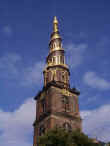 We were up and at ‘em early Monday morning.
Today, it seems, luck is on our side. We step off the bus in Christianshavn
to be all but blinded by the sun. After clicking a few shots of Vor Frelserskirke,
we simply start walking. Just as we are about to turn around and head back in the other
direction, I spot a funky, obviously hand-painted type of gateway or arch. "Christiania"
it proclaims. Laura pipes up and says that she remembers reading something about this in
one of her guide books. We stroll through the gateway. We were up and at ‘em early Monday morning.
Today, it seems, luck is on our side. We step off the bus in Christianshavn
to be all but blinded by the sun. After clicking a few shots of Vor Frelserskirke,
we simply start walking. Just as we are about to turn around and head back in the other
direction, I spot a funky, obviously hand-painted type of gateway or arch. "Christiania"
it proclaims. Laura pipes up and says that she remembers reading something about this in
one of her guide books. We stroll through the gateway.
Those few steps were like walking into a very different place and a very
different time. It seems that this little community is sort of a sophisticated hobo town.
It was ‘founded’ by squatters in the early ‘70’s when the Danish army
left dozens of buildings vacant. Today, its 900-1,000 inhabitants have their own form of
shadow rules, regulations, and governing body. The one message that was clear as we
strolled down ‘main street’ was that the taking of photographs was prohibited.
Although I’m sure it will be woefully inadequate, I’ll try to describe in words
(less than the 1,000 that a picture would be worth), the scene I wasn’t allowed to
capture on film.
The roads were simply wide dirt paths through a chaotic layout of this,
that and the other. What few structures there were, were mostly either built from scratch
(with whatever materials seemed to by on hand), or converted from old campers, vans,
buses, or vendor carts. Most of these ‘shops’ sold hashish, marijuana, or crafts
of some sort. There were beatnik types hanging out and watching us with a half
disinterested, half dubious eye as we walked by. Graffiti was everywhere – some of it
just scribble, and some almost resembling carefully constructed art. In Christiania there
seemed to be more dogs than people. Both the dogs and the people, looked to have, at least
on the surface, the same goal. To just hang out and let the day pass them by.
We did find a shop and artisan studio or two in our brief tour of the
‘town’. These were in the middle to back of the town, the section with the
abondoned army buildings. I understand there are also two nightclubs and a
restaurant near the entrance. Later that evening, we were, by chance, granted the chance
to have a few beers with a 12 year resident of this quaint hamlet. He both fostered, then
quickly dashed my notion of growing my hair down to my knees, changing my name to Svein
Garcia, and running for mayor. The encouraging news was that ‘rent’ (a basic fee
paid by each resident for whatever lodging they have plus the ‘host of
amenities’ provided by the community) is a mere 1,000 Kroner, or about $160 a month.
Everyone pays the same. The bad news is that there is a LONG waiting list to move in. When
a slot does open up, usually via someone dying, the top 10 folks on the list compete for
that one slot by basically ‘campaigning’ for the votes of their neighbors. From
what I gathered, this usually meant a combination of busting your butt to do things for
people, or being slightly more forward with bribes of all sorts. So much for that idea.
 The
next few hours were spent doing that tourist thing, once again, on foot. From across the
canal, we could see Christianborg Palace, previous home to the royal
family (until 1794). Walking around the corner and down a sidestreet (actually
searching for a bathroom) we came to a beautifully placid coutyard, the grounds for Christians
Kirke. The
next few hours were spent doing that tourist thing, once again, on foot. From across the
canal, we could see Christianborg Palace, previous home to the royal
family (until 1794). Walking around the corner and down a sidestreet (actually
searching for a bathroom) we came to a beautifully placid coutyard, the grounds for Christians
Kirke.
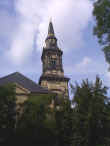 Stopping into the Chamber of Commerce
(the old stock exchange) solved that problem and allowed us to concentrate on the next one
- food. While perusing over sandwich boards, I glance down one of the ally ways and
BOOM, there's Nicholi Kirke staring me right in the face. Stopping into the Chamber of Commerce
(the old stock exchange) solved that problem and allowed us to concentrate on the next one
- food. While perusing over sandwich boards, I glance down one of the ally ways and
BOOM, there's Nicholi Kirke staring me right in the face.
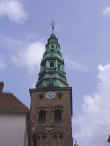 After a quick bite, we head torwards into Kongens Nytorv we
can't help but notice the grandure of Det kongelige Theater. Next,
we head into one of our favorite sections of the city, Nyhavn. After a quick bite, we head torwards into Kongens Nytorv we
can't help but notice the grandure of Det kongelige Theater. Next,
we head into one of our favorite sections of the city, Nyhavn.
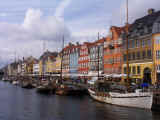 This area, right on the canal, was once Copenhagen's wild sailors quarters.
Now it is filled with outdoor cafes, bars, and resturaunts of every sort. Satisfied
that we had made it to the water's edge, we turned around and headed back down Stroget,
a series of pedestrian only streets joined end-to-end that make up Copenhagen's 'main
drag'. This area, right on the canal, was once Copenhagen's wild sailors quarters.
Now it is filled with outdoor cafes, bars, and resturaunts of every sort. Satisfied
that we had made it to the water's edge, we turned around and headed back down Stroget,
a series of pedestrian only streets joined end-to-end that make up Copenhagen's 'main
drag'.
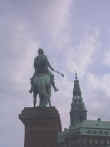 It is there that we happen upon one of the city's most interesting, yet
unknown activities. Climbing to the top of the Rundetaarm and
looking down over the entire old city. This 350 year old tower gives up its
treasures to anyone who will walk the 600 feet of circular path to the top. A whole
new prespective from looking down over the rooftops. It is there that we happen upon one of the city's most interesting, yet
unknown activities. Climbing to the top of the Rundetaarm and
looking down over the entire old city. This 350 year old tower gives up its
treasures to anyone who will walk the 600 feet of circular path to the top. A whole
new prespective from looking down over the rooftops.
Around 6:00 or so ‘dem dogs were a barkin’, so we began our
quest for the perfect refreshment parlor to take a load off. And yes, we were looking for
a little conversation (if things worked out that way), but not with other tourists. We
wanted to find a LOCAL watering hole. Once again, Laura’s sixth sense paid off in
spades. We were well off the beaten path when spotted a small sign. She opened the door
and poked her head in this tiny, dark, basement bar - Windsor Pub, I
believe it was called. If the door wasn’t unlocked, your guess would be that it was
closed. In contrast, most of the other bars in the main area had neon lit signs and
thumping music blaring through not only open doors, but open windows, beckoning all
passers-by to come in and join the fun.
There was a small but noisy bunch at the bar. They stopped socializing
long enough to watch us walk in and take our seats, and then went back to their chatter.
After a few rounds, Michael, the one who knew the most English, and I began to chat. It
wasn't long before Gretchen the bartender, Michael and his friends, and now Laura
and I, became comfortable with one another and began having quite a good time chatting,
laughing, and playing songs on the jukebox. The session ended with Michael and I having a
‘Hotshot’ together. To have this ‘count’ here in Windsor Pub, you must
first place a clothespin on your ear, then slam down your shot. After a wince, you
remove your clothespin and score it with another ‘hotshot mark’ using an ink
pen. Here at Windsor, there were about 150 clothespins lined up proudly behind the
bar, even a tiny clothespin museum. To my surprise, Gretchen was the leader of our group
with over 1,200 marks to her name (over two years).
Overall, I learned a few valuable tidbits from my night at the Windsor,
1) never underestimate a Danish woman’s ability to drink, 2) never ring the brass
bell at the end of the bar (the ringer buys the whole place a round), and 3) according to
one of the fellas at the bar who spent a few years living on the street, "in Denmark,
it is hard to get rich, but even harder to get poor". As a rule, I'm not very
socialized in my thinking, but there may just be something to be said for that way of
life. Bottoms up.
|
